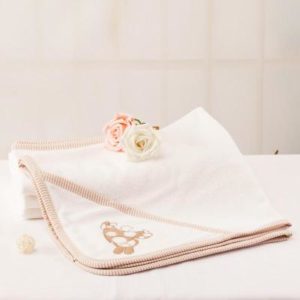Organic cotton is a kind of pure natural and pollution-free cotton. In agricultural production, organic fertilizer, biological control of pests and diseases, and natural farming management are the mainstays. Chemicals are not allowed, and no pollution is required in the production spinning process. , green, environmentally friendly characteristics; organic cotton woven fabrics are shiny, soft to the touch, have excellent resilience, drape, abrasion resistance; have unique antibacterial and deodorant properties; relieve allergic symptoms and reduce normal fabrics Symptoms of skin discomfort, such as rash; more conducive to the care of children’s skin care; summer use, makes people feel particularly cool. Fluffy comfort in winter and excess heat and moisture in the body.
Organic cotton is an important component of sustainable agriculture. It is of great significance to ecological environment protection, human health development, and green and natural ecological clothing. Organic cotton is natural cultivation. It does not use chemical products such as chemical fertilizers and pesticides in the process of planting. 100% natural ecological environment, from seeds to harvest, all natural and pollution-free production, even the colors are natural, and there is no Chemical drugs remain in organic cotton, so they do not induce allergies, asthma or atopic dermatitis.
- Benefit
The organic cotton feels soft and soft, and it has a feeling of being close to nature. This kind of contact with nature can release stress and nourish the energy of the mind.
Organic cotton has good air permeability, absorbs sweat and dries quickly, is not sticky or greasy, and does not generate static electricity.
Organic cotton is completely free of chemical residues due to its production and processing, so it does not induce allergies, asthma or atopic dermatitis. Organic cotton baby clothes are very helpful for infants and young children. Because organic cotton is completely different from conventional cotton, it is all natural and environmentally friendly during the production process and does not contain any substances that are harmful to your baby’s body.
Organic cotton has better breathability, keeps warm, and wears organic cotton. It feels very soft and comfortable, non-irritating, and is very suitable for baby’s skin. And can prevent eczema in children.
According to Japanese organic cotton promoter Yamaoka Junwen, we found that ordinary cotton t-shirts or sleeping cotton sheets that we wear on the body may have more than 8,000 chemicals left on them.
Organic cotton is naturally non-polluting and is therefore particularly suitable for infant and toddler wear. It is completely different from normal cotton fabrics and completely free of any substances harmful to your baby’s body. Even baby with sensitive skin can use it with confidence. The baby’s skin is very delicate and does not adapt to harmful substances. Therefore, choosing a soft, warm and breathable organic cotton dress for infants can make the baby feel very comfortable and soft, and will not stimulate the baby’s skin.
- Dyeing
Due to the inherent nature of organic cotton during planting and weaving, existing chemical synthetic dyes cannot be dyed. Only natural dyes are used for natural dyeing. Naturally dyed organic cotton has more colors to meet more needs.
- Certification body
1. International certification body: Organic cotton needs to be certified in the international market. There are many organizations engaged in the formulation and certification of organic cotton standards abroad, mainly including the International Federation Of Organic Agriculture Movement (1FOAM). Organic Trade Association (OTA), USDA Organic’s Soil Association, Germany’s International Association of Natural Textile Industries (IVN.International Association Natural Industry), European International Organization (Demeter), Sweden and Northern Europe (KRAV) and Japan’s Japan Organic Cotton Association (JOCA, Japan Organic Cotton Association). The IMO (Institute for Marketecology) and the Dutch Skal (currently called Control Union) are well-known international certification bodies, and both IMO and Control Union are authorized institutions that can certify the standards according to the standards. IMO and Control Union are also the certification bodies for major brand and retail supermarket organic cotton projects in Turkey, India, China, Pakistan, and Africa.
2. Domestic organic cotton planting certification institutions: China Green China Organic Food Certification Center and Nanjing Guohuan Organic Product Certification Center are domestic certification bodies; Axel is an international certification body.
3. Domestic organic cotton product production and processing certification body: Control Union; IMO; Ecocert
4. International Organic Cotton Product Processing Standard: GOTS; OCS



